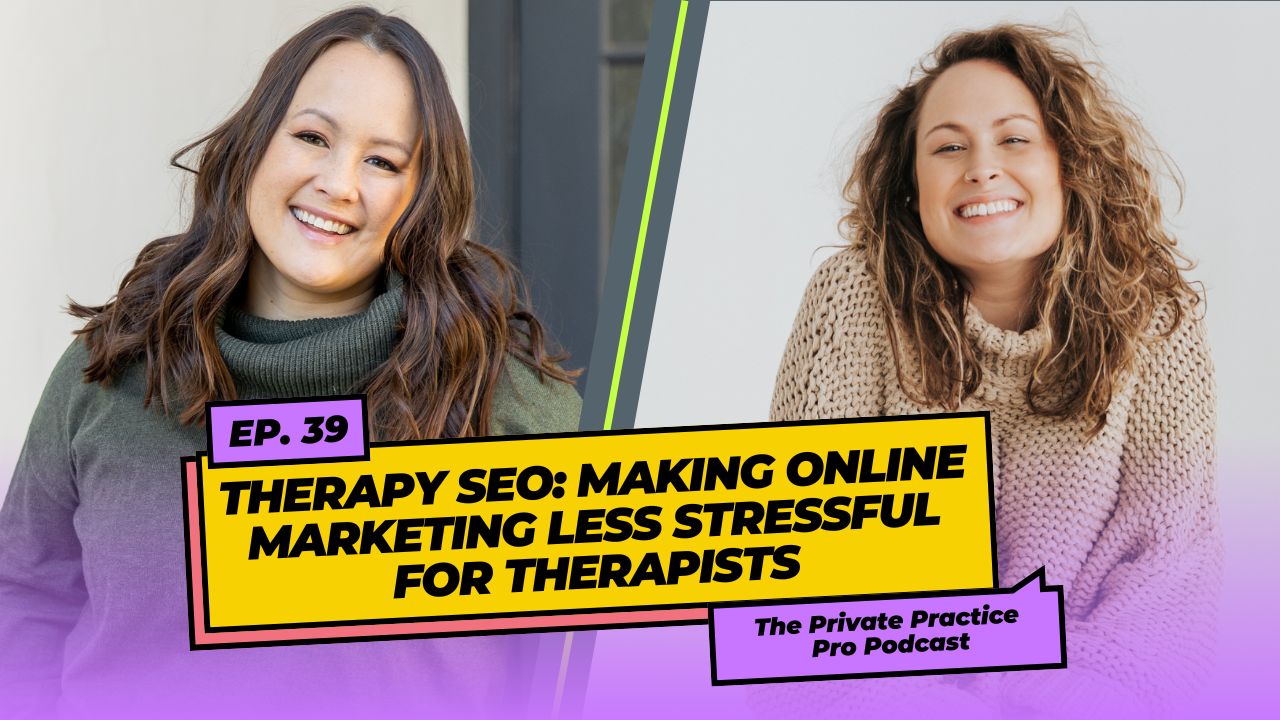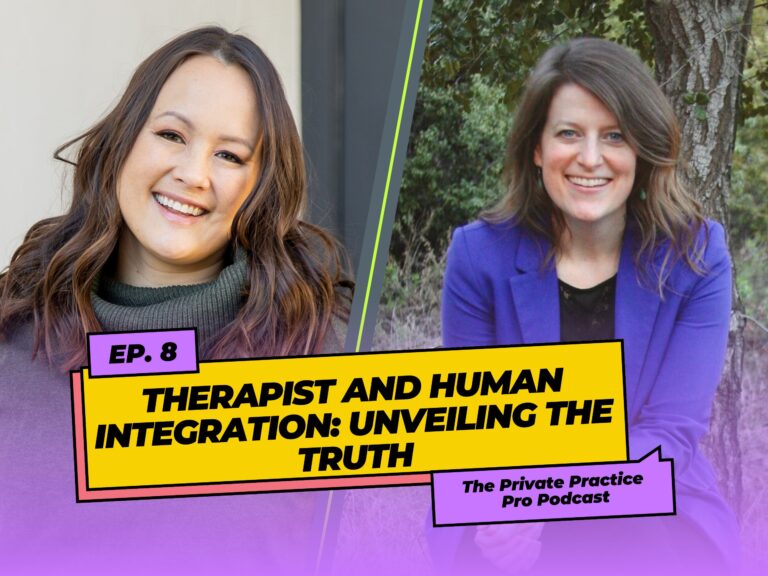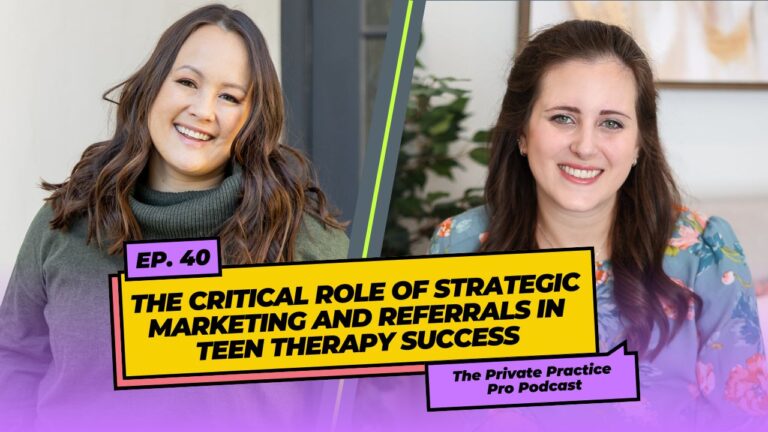Therapy SEO: Making Online Marketing Less Stressful for Therapists

I recently had the privilege of engaging in a thought-provoking conversation with the distinguished Kristie Plantinga, MA, an authority on therapy marketing strategies and SEO for private therapy practice. I am eager to impart the invaluable insights we discussed.
The realm of digital marketing can often seem daunting, akin to traversing an untamed wilderness. However, fear not, for Kristie and I have ventured through the intricacies of SEO, social media, search engine rankings, search results, and search engine results pages (SERPs). We understand the demands of your practice, and we are committed to providing you with the tools to excel in online marketing efficiently, ensuring you avoid the pitfalls of professional burnout.
Moreover, we delved into the transformative potential of Artificial Intelligence. Technologies such as ChatGPT are revolutionizing the way we approach content creation, offering unprecedented ease and innovation. Kristie’s perspective is clear: by embracing these advancements, you can significantly enhance your keyword research, blog content, meta descriptions, alt tags, content strategy and fortify your marketing endeavors with strategic use of tags, analytics, and search engines.
It is crucial to acknowledge that the digital landscape is in a constant state of flux. To maintain a competitive edge, it is imperative to stay informed of the latest trends and developments. Your online reputation is an asset of immeasurable value—nurture it with authenticity and consistency to ensure it resonates mental health audience and boosts search engine visibility. Avoid practices like keyword stuffing and focus instead on a user-centered experience that improves credibility and user experience.
As you resume your digital endeavors, consider these key strategies: refine your online marketing skills with expert guidance, leverage AI as a powerful ally, remain adaptable to changes within the industry, cultivate a compelling online identity, and position yourself prominently on directories that truly make a difference. Join us in this episode to explore these topics further and transform your digital marketing approach.

I founded TherapieSEO to help you reach more clients on Google one search at a time. After working in the digital marketing industry, I became inspired to serve a population close to my heart: therapists. I have personally experienced the benefits of therapy and have a degree in psychology. I founded TherapieSEO to serve in the space where my passion and people’s needs meet: writing, designing, and marketing for therapists, so they can serve people looking for help.
Website: www.therapieseo.com
Website: www.besttherapists.com
Email: [email protected]
The Role of SEO in Starting a Private Practice
If you’ve ever felt overwhelmed by the idea of starting a private practice, you’re not alone. The journey of building a private practice takes clinical expertise and a solid grasp of digital tools that connect you with clients.
SEO—short for search engine optimization—is no longer optional for success. On the contrary, it’s essential.
With many clients turning to Google to find therapists, your ability to appear on page one of the search engine results page (SERP) can make or break your practice. Consequently, strategic keyword use, location-based SEO (e.g., “anxiety therapy Grand Rapids”), and high-quality content help ensure your services reach the people who need them.
Keyword research, especially with tools like Semrush, helps therapists identify what clients are searching for. For example, whether it’s “child counseling near me” or “telehealth therapist for anxiety,” using these terms increases your search engine visibility.
Kristie recommends creating high-quality, human-first content like blogs, FAQs, and landing pages. These demonstrate clinical authority and reflect your unique voice. In today’s SEO climate, authentic, informative content is prioritized because it enhances credibility and user experience.
Building an Authentic Digital Presence
Your digital footprint should reflect your practice’s core values—not just function as an online listing. That’s why consistency in branding, tone, and messaging across your website, social media, and directories pays dividends.
Kristie urges therapists to think beyond the basics. A blog or therapist guide can showcase your expertise. More importantly, you must connect these assets to your SEO strategy. Use alt tags for images, structured data, and strong meta descriptions that highlight your niche and location.
Backlinks—links from reputable sites to yours—remain vital for SEO. Kristie’s directory, BestTherapists.com, helps therapists gain exposure without getting lost in overcrowded lists. By limiting listings to six therapists per page, the platform boosts visibility and mirrors the benefits of top Google SERP positions.
As a result, this model provides SEO advantages without requiring a heavy content production schedule.
Private Practice Marketing: Sustainable Strategies
Many therapists like the idea of marketing therapy private practice organically. In reality, a hybrid strategy can work well. Combining content marketing, online directories, and community outreach creates balance and sustainability.
If you only have an hour per week to focus on marketing, Kristie suggests starting with Google Business. It’s free, local, and one of the most underused tools in therapy marketing. Because of its location-based results, it gives new practices a chance to compete in crowded markets.
Next, Kristie recommends a simple content schedule. Publishing just one blog per month—focused on topics like anxiety, child therapy, or relationship challenges—can help grow your search engine rankings over time.
She also encourages link-building through guest posts or podcasts. Not only does this elevate your SEO, but it also helps position you as a thought leader in the mental health space.
Using Analytics to Make Smart Decisions
The importance of analytics can’t be overstated. Whether you’re tracking traffic, bounce rates, or conversions, tools like Google Analytics and Semrush reveal what’s effective—and what isn’t.
This clarity helps therapists avoid wasted effort on tactics that don’t work. For instance, if one blog consistently drives traffic while another doesn’t, that data allows you to fine-tune your content strategy. Small adjustments over time can yield big results.
Paid ads—like those using cost per click (CPC)—are also worth considering. They can be a scalable way to gain new clients, especially if paired with strong landing pages. Kristie notes that acquiring a client may cost $100–$300. However, if that client attends several sessions, the investment pays off quickly.
Long-Term Growth and Resilience
Kristie points out that digital marketing is ever-changing. Algorithms shift. Platforms evolve. Trends come and go. Therefore, what worked last year may not work today.
Resilience and adaptability are essential for long-term success. While offline relationship-building—like partnering with doctors or attending local events—still has value, your digital strategy should evolve alongside your practice.
To reduce risk, don’t rely on a single platform. A well-rounded approach includes SEO, a good website, local directories, blog content, Google Business, and a modest social presence. Ultimately, the more places you show up online, the more visibility you earn.
Final Thoughts
Thanks to Kristie Plantinga and tools like TherapieSEO, therapists no longer have to choose between quality care and marketing success. Whether you’re learning how to start a private therapy practice or want to level up your SEO, now is the time to act.
As Kristie wisely said: “I founded TherapieSEO to help you reach more clients on Google—one search at a time.”
This is your chance to grow your private practice with confidence, clarity, and purpose.







